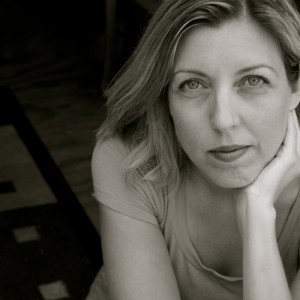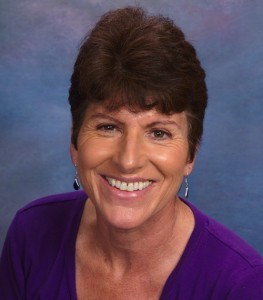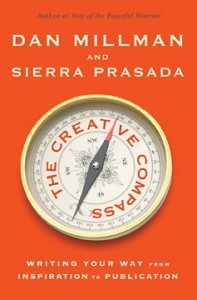Midge Raymond's Blog, page 25
November 18, 2013
Weekly Writing: Hanging on
November 14, 2013
Mini Q&A with poet Kelli Russell Agodon
This is an excerpt of Kelli Russell Agodon’s Q&A in Everyday Book Marketing, in which she talks about unique book promo ideas and offers advice for new authors. For more book promo information, and to read Kelli’s complete Q&A, check out Everyday Book Marketing.
Kelli Russell Agodon is the author of Letters from the Emily Dickinson Room, Small Knots, and Geography. She co-edited Fire On Her Tongue: An eBook Anthology of Contemporary Women’s Poetry. Kelli is the editor of Crab Creek Review and the co-founder of Two Sylvias Press. Her third book of poems, Hourglass Museum, will be published in 2014.
Q: What was the single most successful thing you’ve done to promote your books?
A: Oddly, I’m not sure I’d have any idea what one thing it is, but probably a coming together of many. Having my poem on Poetry Daily (www.poems.com) was a huge boost because poetry readers visit there daily, so I connected with a lot of people outside my area.
Another thing I did was send my book to ten random people. These can go to anyone, like a reader who sends me an e-mail saying they liked a poem of mine, or I may mail a copy off to Garrison Keillor for his “Writer’s Almanac” radio show. I just like sending my book out into the world and seeing what happens—sometimes nothing, sometimes a lot.
From my ten-random-people experiment, my poem went on to be recited by Garrison Keillor on his radio show and then ended up in his Good Poems for Hard Times anthology. You never know what doors your book will push open, and it’s a fun way to connect with others and send your work into the world.
Q: What advice do you have to offer new authors?
A: 1) If you’re trying to publish your book, be persistent.
2) If you have a book published and are trying to market it, be polite and professional.
3) Use your newly acquired fame to help promote other writers you like. It’s wonderful to support others, and having a book will give you the platform to help raise others up and share their work as well. Remember, we are a writing community full of readers and writers. Share the wealth with others, and let that good karma come back to you twofold.
4) Remember there is no one way to be a writer in the world. Try new things (make a book trailer, start a Facebook page) and find ways to promote your book that make you feel good. If you like working with people, see if you can volunteer somewhere. Or visit someone’s book group. Find ways to share your book with others that you enjoy.
5) Don’t judge your success by your royalty check. We are artists first, and we can’t judge our work by a dollar sign.
To read Kelli’s complete Q&A, check out Everyday Book Marketing. And visit Kelli online at www.agodon.com.
Tweet
November 11, 2013
Weekly Writing: Colors and beyond
Write about orange. This could be the color, the fruit, anything you associate with this word.
Then, write about purple. Then, blue.
Tweet
November 7, 2013
5 Tips for writers at Women’s Fiction Writers
Today I’m delighted to be a guest on Women’s Fiction Writers, the fantastic blog of Amy Sue Nathan, author of The Glass Wives. For those of you who don’t know of Amy’s blog, check it out and keep returning for awesome tips, guest posts, and other resources for women writers of fiction on editing, publishing, and the writing life. I escpecially love the blog’s tagline: “no heroes. no zombies. no high heels. well, maybe high heels.”
In this guest post, I offer 5 tips for how to be an Everyday Writer — that is, how to keep writing when you’re not actually writing. There are myriad ways to stay connected to your work even when you’re not able to be in the chair…and I hope you find these tips helpful.
If you’re participating in National Novel Writing Month this year, you might find that these 5 tips help keep you on track. Even if many of the tips involve away-from-the-desk activities, what you gain from these will most likely affect your writing directly.
Happy writing!
Tweet
November 4, 2013
Weekly Writing: Day’s end
Write about the end of the day. What do you do; where do you go; what rituals, if any, do you have? What’s your favorite thing to do at the end of a day — and how often are you able to do it?
Tweet
October 29, 2013
Mini Q&A with author L.J. Sellers
This is an excerpt of L.J. Sellers’s Q&A in Everyday Book Marketing, in which she talks about self-publishing and her path to an Amazon book deal. For more book promo information, and to read L.J.’s complete Q&A, check out Everyday Book Marketing.
L.J. Sellers is an award-winning journalist and author of the bestselling Detective Jackson mystery/thriller series as well as standalone thrillers. A Readers’ Favorite winner, L.J.’s novels have been praised by Publishers Weekly, Mystery Scene, and Suspense Magazine, and her Jackson books are the highest- rated crime fiction series on Amazon.
Q: Tell us about how your first book came into the world, and how this led you onto the path of being (and remaining) an independent author.
A: I self-published my first Detective Jackson novel in 2007 after receiving rave rejections from major publishers. That was before the Kindle was released and print-on-demand publishing became available to individuals, so I spent a small fortune on a print run of 3,500 mass-market paperbacks. Then I worked like a madwoman to find a distributor and reach out to bookstores. I got lucky, and the novel was well received and reviewed. So I wrote two more books in the series, which were picked up and published by a small press. I spent ten times as much money promoting the books as I made in royalties. Despite the wonderful reviews from readers, I strongly considered giving up the series and even wondered if I should continue writing fiction. Then I was laid off my newspaper job, and the year 2010 looked very bleak for me.
But during those years, e-books had emerged as a growing market, and POD became a viable option for print books. So I started looking at my options and decided to upload my unpublished stand-alone thrillers to Kindle to see if I could generate some income. I quickly realized I needed to leave my publisher, get the rights back to my Jackson series, and self-publish every story I had—both as an e-book and as a POD print offering. Which I spent a good chunk of the year doing. After I uploaded the fourth Jackson novel in late October, I turned down freelance work for nearly a month and spent eight hours a day promoting my novels. I wrote blogs and articles, posted in forums, bought a few newsletter ads, and gave away hundreds of e-books on Goodreads and LibraryThing.
The results were astounding. By the end of the year, my series was a Kindle bestseller, and I was making a living selling e-books. Since then I’ve published another five books, and I’m living my dream of being a full-time novelist. But that term is a little misleading. Because I was self-published with ten books on the market, I spent as much time running my business as I did writing the next novel.
But all that has changed. Last year I signed an eleven-book contract with Amazon Publishing—nine backlist titles and two new novels. For the record, it’s the only publisher I even considered selling to. Amazon’s contracts are writer-friendly and generous compared to other publishers. And now that the new versions are on the market, Amazon is heavily promoting them, and my sales have doubled. I’m finally free to write full- time. My lifelong dream.
Q: What has been your biggest marketing challenge?
A: The biggest challenge in marketing is to keep finding new opportunities. Because what worked in 2010 quit working in 2011 when every other author started doing the same thing. And what worked six months ago is no longer as effective now. The market is constantly changing, and the competition is fierce. So I continuously have to find and try new marketing ideas, and it’s time consuming.
Q: What advice do you have to offer authors who plan to self-publish?
A: The first thing is to have your work evaluated by objective professionals in the industry to determine if it has commercial potential. If your novel is marketable, then you have a green light to make the investment you need to be competitive. At that point, you need to decide what your goals are. Do you simply want to publish your book to see it in print for family and friends? Will fiction be a sideline, or do you want to make a living from it? Determining what you want out of the self- publishing experience will help you decide how much time and money to spend. Because if you want to sell well and earn a living, the next step is to invest real money in editing, cover design, professional formatting, and promotional spots. You also should commit to spending a couple hours a day on promotion—social networking, blogging, posting in forums, and querying book reviewers. If professionals don’t consider your work to be marketable or you don’t have the time and money to invest at an appropriate level, then you may need to accept that writing novels is a hobby and whatever you invest may never be recovered. That may sound harsh, but it’s the reality of a very competitive market.
To read L.J.’s complete Q&A, check out Everyday Book Marketing. And click here to visit L.J.’s website.
Tweet
October 28, 2013
Weekly Writing: Illness
October 24, 2013
Book Review: The Creative Compass
The Creative Compass: Writing Your Way from Inspiration to Publication, by Dan Millman and Sierra Prasada, is a helpful guide for beginning writers that focuses on five stages of creativity.
Dan Millman, well known for his book Way of the Peaceful Warrior, has teamed up with his daughter, journalist Sierra Prasada, for this new book on writing, creativity, and publication. They include their personal journeys as well as tips and guidelines for authors beginning their own journeys.
The first stage, Dream, is about defining one’s story — finding ideas that stick and going from there to defining character, finding plots, considering setting. I especially like the concept of “dreaming in dialogue,” which encourages the writer and his/her alter ego to have a role-play type conversation that helps in discovering characters’ motives, plot twists, etc.
The Draft section is about telling one’s story, from beginning to end, and this section covers topics from using the senses to doing research. In the Develop section, the authors raise the question of hard work versus talent, revision (and reinvention), and the importance of never giving up.
The Refine stage covers sentence-level editing, from trimming to punctuation, and the Share section addresses how to publish and market your work, as well as how to handle rejection (there are some wonderfully inspiring rejection stories here!). One thing I think will be particularly helpful to new writers is the authors’ notion of Nine Sales — that is, the myriad ways in which all writers must sell their books, from selling it to themselves, to their literary agents, and to their editors, all the way to their sales reps and their readers.
Throughout the book, Millman and Prasada remind us to go back to story whenever we’re stuck — to ask the important questions, such as “What’s the story about?” and “Who’s our audience?” For those writers who are new to workshopping or seeking/giving feedback, the book includes what questions to ask your prospective readers in order to get the most constructive feedback possible.
The Creative Compass features a helpful FAQ index near the beginning of the book, referencing such immediate questions as how to find one’s voice as an author, when to ask for feedback, and how journaling may be useful. Inspiring quotes by authors pepper all pages of the book, and a section at the end devotes five pages to quotations. The Creative Compass is an inspiring guide for anyone just beginning to explore their creative selves through writing, as well as those who are just beginning to get a sense of the stories they want to tell.
Tweet
October 21, 2013
Weekly Writing: Sales
Write about a time someone tried to sell you something you didn’t want, from life insurance to a new faith to an item at a flea market.
Tweet
October 18, 2013
A Q&A with The Penmen Review
I was delighted to chat with Pamme Boutselis at The Penmen Review about the joys and challenges of writing, book marketing, being an editor, and more.
A million thanks to Pamme for this Q&A!
And writers: Check out The Penmen Review, which includes not only articles and resources for writers but is an online magazine featuring poetry, fiction, and essays, and more (check out the submission guidelines here).
Tweet









